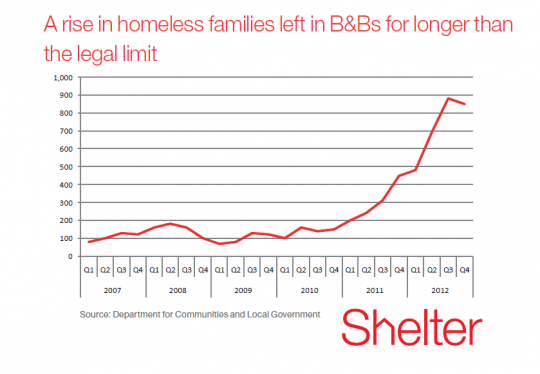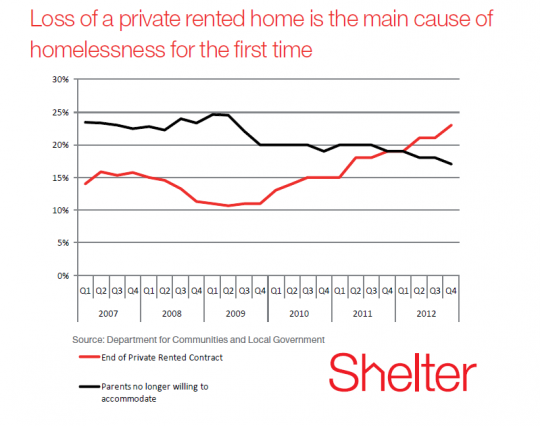Recently released statistics show a striking rise in homelessness in the UK. Deborah Garvie summarises this trend and explains how councils are struggling to cope with the number of people at risk of homelessness who are seeking their help. While the correlation itself does not establish causation, she suggests it is unlikely to be a coincidence that homelessness is rising as benefits are cut.
Two days after George Osborne’s budget for an ‘aspiration nation’, with its focus on home ownership, new homelessness statistics revealed the reality for people at the sharp end of Britain’s housing crisis. Homelessness acceptances are up 10% since 2011 to 53,450 households, 64% of them accepted because they’re families with dependent children. The number of households placed in B&B accommodation is up 26% to 4,000, including 1,690 families with children. The number of families stuck in B&Bs beyond the legal six-week limit has continued to rise year on year. Every one of these families has experienced one of the most terrifying things any parent can face: being unable to provide your children with a home.
The yearly ‘prevention and relief’ statistics show that a further 199,000 households were assisted by councils to stay in their homes, or move to another, outside of the homelessness legislation. It’s clear that local councils all over the country are struggling to cope with the number of people at risk of homelessness coming through their doors.
So the number of people asking for help has gone up and large numbers are being assisted. But the Government, and local councils, must get to grips with the underlying causes of this growing tragedy. Over a fifth (21%) of homelessness acceptances were triggered by the loss of an assured shorthold tenancy (AST). This makes the private rented sector the leading cause of homelessness. Two years ago, just 14% of statutory homelessness cases were attributed to the loss of an AST.
What’s happened in the meantime? Well, clearly the recession, unemployment and stagnant wages are taking their toll. So are rapidly increasing private rents. This has led to more and more people in work having to claim top-up housing benefit to cover the rent – housing benefit has been ‘taking the strain’. But at the time people most need this support to stay in their homes, it is being cut – and cut hard and fast. It can’t be directly proven from the statistics alone, but it can be no coincidence that this sharp rise in homelessness is linked to two years of cuts to housing benefit.
And what is the Government’s solution for people threatened with this situation – those who can’t even cover the rent, let alone take on a huge mortgage? Major investment in secure and affordable council homes? Well, no. The Government’s solution, introduced last November, is to allow councils to offer homeless people another assured shorthold tenancy in the private rented sector, while at the same time making further year-on-year cuts to housing benefit. We’ve warned that housing benefit cuts and a reliance on short-term private lettings could lead to revolving door homelessness.
These latest statistics show we must increase the supply of stable and genuinely affordable rented homes: Stable Rental Contracts in the private rented sector, continued assistance with sky-rocketing rents and, most of all, giving councils the financial ability to build the secure and affordable homes that people coming through their doors so desperately need.
Note: This article gives the views of the author, and not the position of the British Politics and Policy blog, nor of the London School of Economics. Please read our comments policy before posting.
This post originally appeared on Shelter’s Policy Blog.
Deborah Garvie is a Senior Policy Officer at Shelter, working on the Localism Act and policies for the delivery, letting and management of social housing. To find out more about Shelter see their website and Twitter feed.









1 Comments